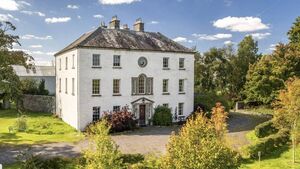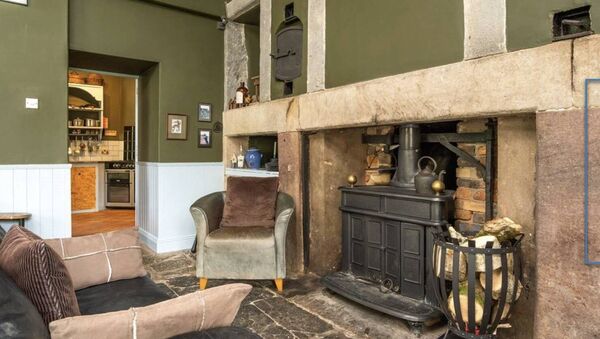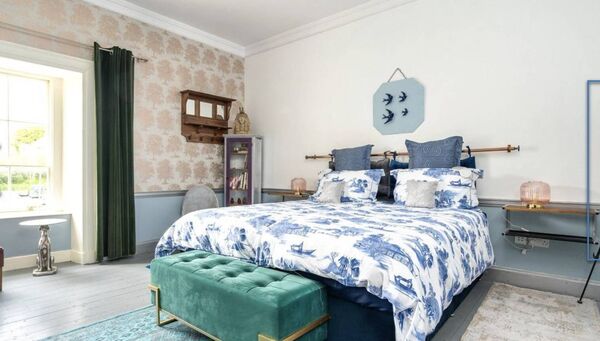Historic County Roscommon property currently operating as B&B is a real gem

Frybrook House, Bridge Street, Boyle has been recently renovated and restored to its former glory.
One of the finest and most important Georgian properties in County Roscommon has arrived on the market.
Frybrook House, Bridge Street, Boyle, guiding for €850,000, has been recently renovated and restored to its former glory.
This distinguished period residence, on the market with Savills, is set on mature grounds alongside the Boyle River.
Located in the heart of the historic town of Boyle, Frybrook House is a distinguished Georgian residence that seamlessly blends 18th-century elegance with modern comfort. Its peaceful riverside setting evokes the charm of a country estate, yet the property is centrally located in the town with all of its amenities on the doorstep, offering the rare combination of tranquillity and convenience.
The house is approached through a gated, pillared entrance beside the gate lodge. A sweeping driveway, flanked by mature trees, leads to the main residence.
Sensitively restored by its current owners in recent years, Frybrook House is presented in excellent condition and currently operates as a bed and breakfast, reflecting both its architectural pedigree and commercial potential. Accommodation is arranged over three principal storeys offering generous proportions and refined living spaces. The interiors are thoughtfully curated with original detailing, and a harmonious blend of period character and contemporary design.
The house features high ceilings, delicate cornicing, and a sweeping original staircase. There are three bedrooms to the front while there is scope to create a private quarters to the rear, with four further bedrooms and a toilet facility on the ground floor along with another room that can work as a bedroom/office/sitting room. All bedrooms are ensuite. The layout and scale lend themselves equally to family living, hospitality or alternative ventures. “Frybrook House represents a rare opportunity to acquire a residence of distinction, combining heritage, amenity, and income-generating potential in one of the west of Ireland' s most characterful towns,” said the selling agents.
In all the accommodation extends to approximately 7,424 sq ft / 689 sq m.

Positioned beside the entrance and overlooking the Boyle River, the gate lodge is believed to date from 1753. It has been sympathetically renovated and is currently tenanted as a cafe/bistro offering an additional amenity and a complementary income stream to the main house. Further information available from the selling agents on request.
To the rear of the property, a collection of traditional outbuildings and storage sheds provide practical utility and potential for further development, subject to planning.

The grounds surrounding Frybrook House extend to approximately three acres (1.2 hectares) and include a private garden and parkland area. Maintained with an emphasis on sustainability and biodiversity, the land was formerly used for grazing Connemara ponies and now offers a peaceful and picturesque setting. Mature trees, open lawns, and the gentle flow of the Boyle River contribute to the estate' s serene atmosphere, creating a natural retreat in the centre of town.
Frybrook' s origins lie in 1743, when Henry Fry was invited by Lord Kingston to establish a weaving enterprise on the banks of the Boyle River. The venture prospered and, within a decade, Fry commissioned the construction of Frybrook House in c.1753. Built in the Georgian style it is one of the most architecturally distinguished in the county, with a design incorporating classic Palladian motifs. Frybrook became the Fry family seat for more than 230 years. Throughout its history, Frybrook was synonymous with hospitality and civic duty. The bell once mounted on its roof rang daily to invite the townspeople to dine, while during the 1798 Rising French officers were welcomed here. During the Great Famine, the estate played a vital role, distributing food prepared in its famine cauldron (which still sits in the old kitchen) and bread from its bakehouse. Remarkably, Frybrook survived the upheavals of 19th and early 20th-century Ireland, including the 1916 Rising, the War of Independence and the Civil War. Today it endures as one of Boyle' s most significant historic residences and a lasting testament to the Fry family.





